Hospitality Industry Analysis and Case Studies
VerifiedAdded on 2020/10/22
|10
|2540
|256
AI Summary
This assignment requires students to analyze the hospitality industry, including its size, scope, and economic impact. It also involves examining case studies of different companies in the industry, such as Audley Travel, Thomas Cook, and British Airways. The assignment includes references from academic sources and online articles, providing a comprehensive understanding of the industry and its players.
Contribute Materials
Your contribution can guide someone’s learning journey. Share your
documents today.
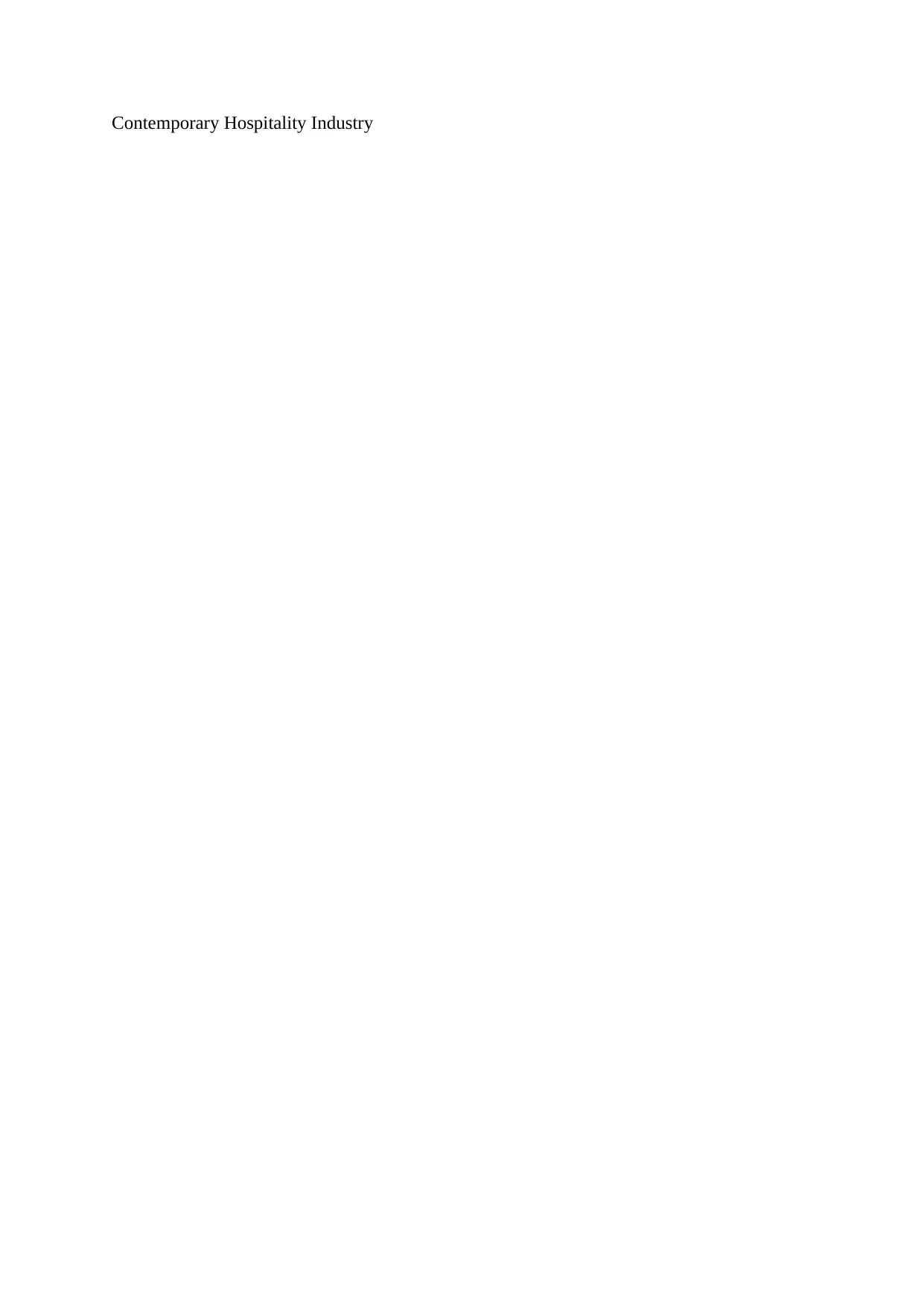
Contemporary Hospitality Industry
Secure Best Marks with AI Grader
Need help grading? Try our AI Grader for instant feedback on your assignments.
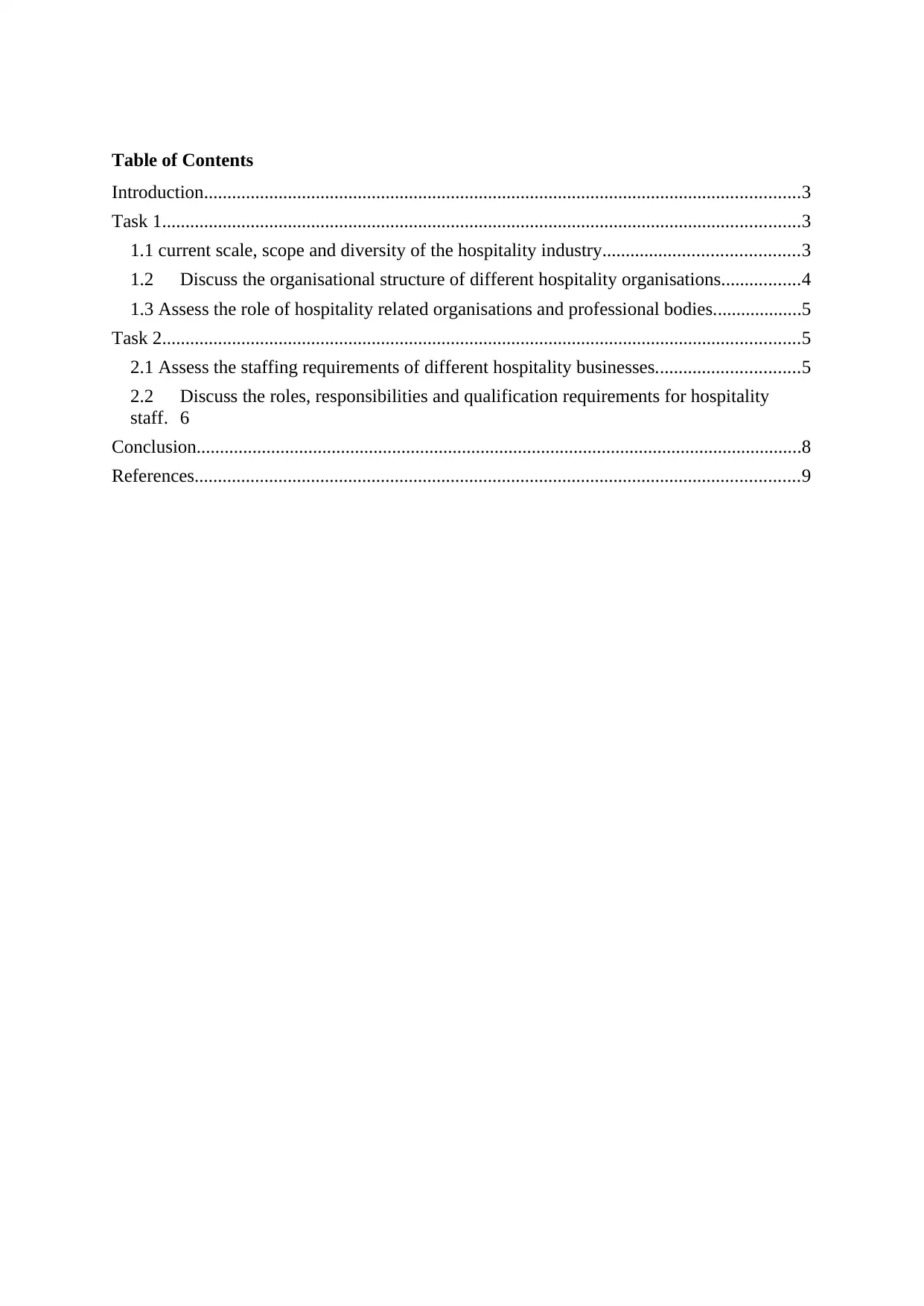
Table of Contents
Introduction................................................................................................................................3
Task 1.........................................................................................................................................3
1.1 current scale, scope and diversity of the hospitality industry..........................................3
1.2 Discuss the organisational structure of different hospitality organisations.................4
1.3 Assess the role of hospitality related organisations and professional bodies...................5
Task 2.........................................................................................................................................5
2.1 Assess the staffing requirements of different hospitality businesses...............................5
2.2 Discuss the roles, responsibilities and qualification requirements for hospitality
staff. 6
Conclusion..................................................................................................................................8
References..................................................................................................................................9
Introduction................................................................................................................................3
Task 1.........................................................................................................................................3
1.1 current scale, scope and diversity of the hospitality industry..........................................3
1.2 Discuss the organisational structure of different hospitality organisations.................4
1.3 Assess the role of hospitality related organisations and professional bodies...................5
Task 2.........................................................................................................................................5
2.1 Assess the staffing requirements of different hospitality businesses...............................5
2.2 Discuss the roles, responsibilities and qualification requirements for hospitality
staff. 6
Conclusion..................................................................................................................................8
References..................................................................................................................................9
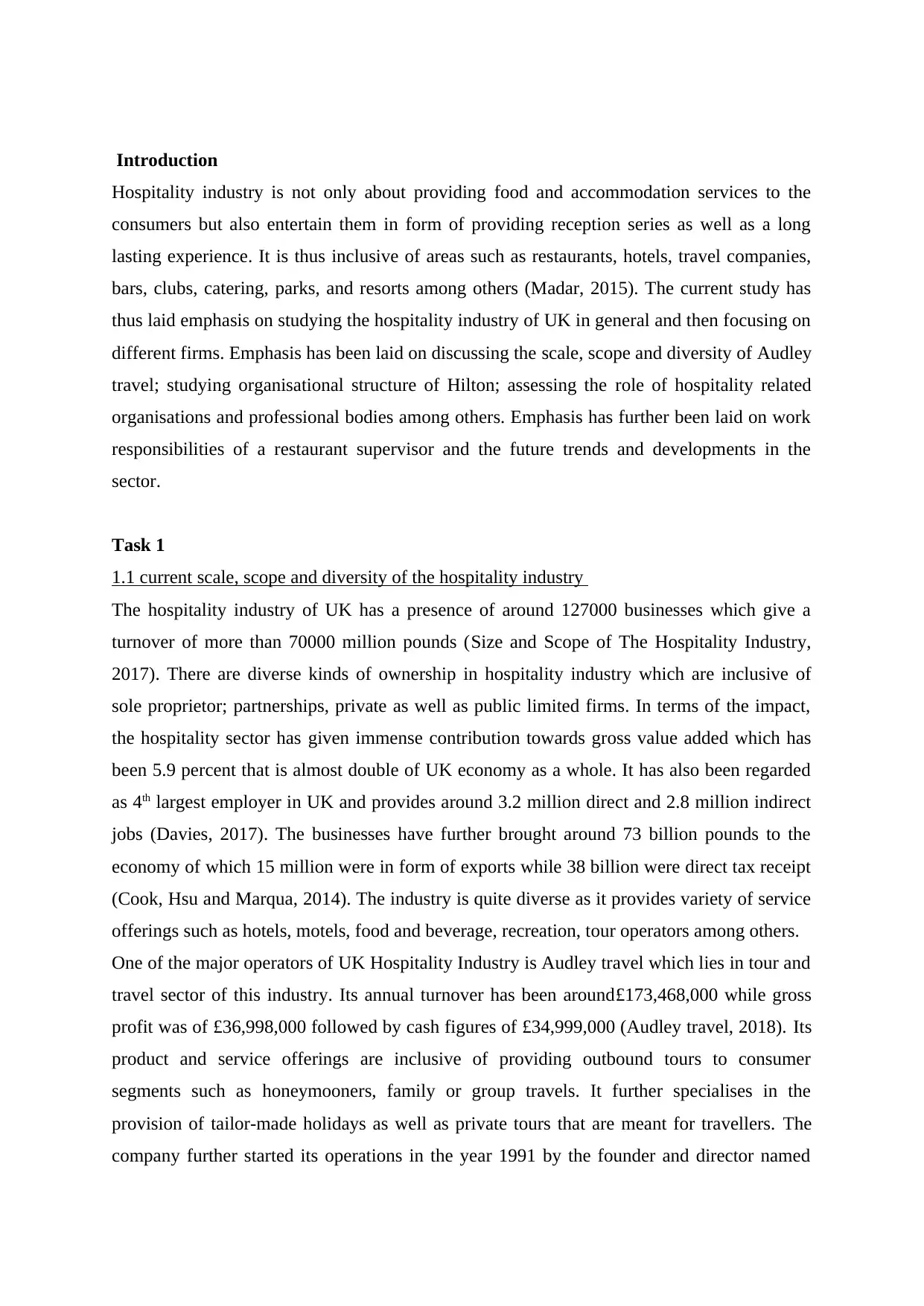
Introduction
Hospitality industry is not only about providing food and accommodation services to the
consumers but also entertain them in form of providing reception series as well as a long
lasting experience. It is thus inclusive of areas such as restaurants, hotels, travel companies,
bars, clubs, catering, parks, and resorts among others (Madar, 2015). The current study has
thus laid emphasis on studying the hospitality industry of UK in general and then focusing on
different firms. Emphasis has been laid on discussing the scale, scope and diversity of Audley
travel; studying organisational structure of Hilton; assessing the role of hospitality related
organisations and professional bodies among others. Emphasis has further been laid on work
responsibilities of a restaurant supervisor and the future trends and developments in the
sector.
Task 1
1.1 current scale, scope and diversity of the hospitality industry
The hospitality industry of UK has a presence of around 127000 businesses which give a
turnover of more than 70000 million pounds (Size and Scope of The Hospitality Industry,
2017). There are diverse kinds of ownership in hospitality industry which are inclusive of
sole proprietor; partnerships, private as well as public limited firms. In terms of the impact,
the hospitality sector has given immense contribution towards gross value added which has
been 5.9 percent that is almost double of UK economy as a whole. It has also been regarded
as 4th largest employer in UK and provides around 3.2 million direct and 2.8 million indirect
jobs (Davies, 2017). The businesses have further brought around 73 billion pounds to the
economy of which 15 million were in form of exports while 38 billion were direct tax receipt
(Cook, Hsu and Marqua, 2014). The industry is quite diverse as it provides variety of service
offerings such as hotels, motels, food and beverage, recreation, tour operators among others.
One of the major operators of UK Hospitality Industry is Audley travel which lies in tour and
travel sector of this industry. Its annual turnover has been around£173,468,000 while gross
profit was of £36,998,000 followed by cash figures of £34,999,000 (Audley travel, 2018). Its
product and service offerings are inclusive of providing outbound tours to consumer
segments such as honeymooners, family or group travels. It further specialises in the
provision of tailor-made holidays as well as private tours that are meant for travellers. The
company further started its operations in the year 1991 by the founder and director named
Hospitality industry is not only about providing food and accommodation services to the
consumers but also entertain them in form of providing reception series as well as a long
lasting experience. It is thus inclusive of areas such as restaurants, hotels, travel companies,
bars, clubs, catering, parks, and resorts among others (Madar, 2015). The current study has
thus laid emphasis on studying the hospitality industry of UK in general and then focusing on
different firms. Emphasis has been laid on discussing the scale, scope and diversity of Audley
travel; studying organisational structure of Hilton; assessing the role of hospitality related
organisations and professional bodies among others. Emphasis has further been laid on work
responsibilities of a restaurant supervisor and the future trends and developments in the
sector.
Task 1
1.1 current scale, scope and diversity of the hospitality industry
The hospitality industry of UK has a presence of around 127000 businesses which give a
turnover of more than 70000 million pounds (Size and Scope of The Hospitality Industry,
2017). There are diverse kinds of ownership in hospitality industry which are inclusive of
sole proprietor; partnerships, private as well as public limited firms. In terms of the impact,
the hospitality sector has given immense contribution towards gross value added which has
been 5.9 percent that is almost double of UK economy as a whole. It has also been regarded
as 4th largest employer in UK and provides around 3.2 million direct and 2.8 million indirect
jobs (Davies, 2017). The businesses have further brought around 73 billion pounds to the
economy of which 15 million were in form of exports while 38 billion were direct tax receipt
(Cook, Hsu and Marqua, 2014). The industry is quite diverse as it provides variety of service
offerings such as hotels, motels, food and beverage, recreation, tour operators among others.
One of the major operators of UK Hospitality Industry is Audley travel which lies in tour and
travel sector of this industry. Its annual turnover has been around£173,468,000 while gross
profit was of £36,998,000 followed by cash figures of £34,999,000 (Audley travel, 2018). Its
product and service offerings are inclusive of providing outbound tours to consumer
segments such as honeymooners, family or group travels. It further specialises in the
provision of tailor-made holidays as well as private tours that are meant for travellers. The
company further started its operations in the year 1991 by the founder and director named
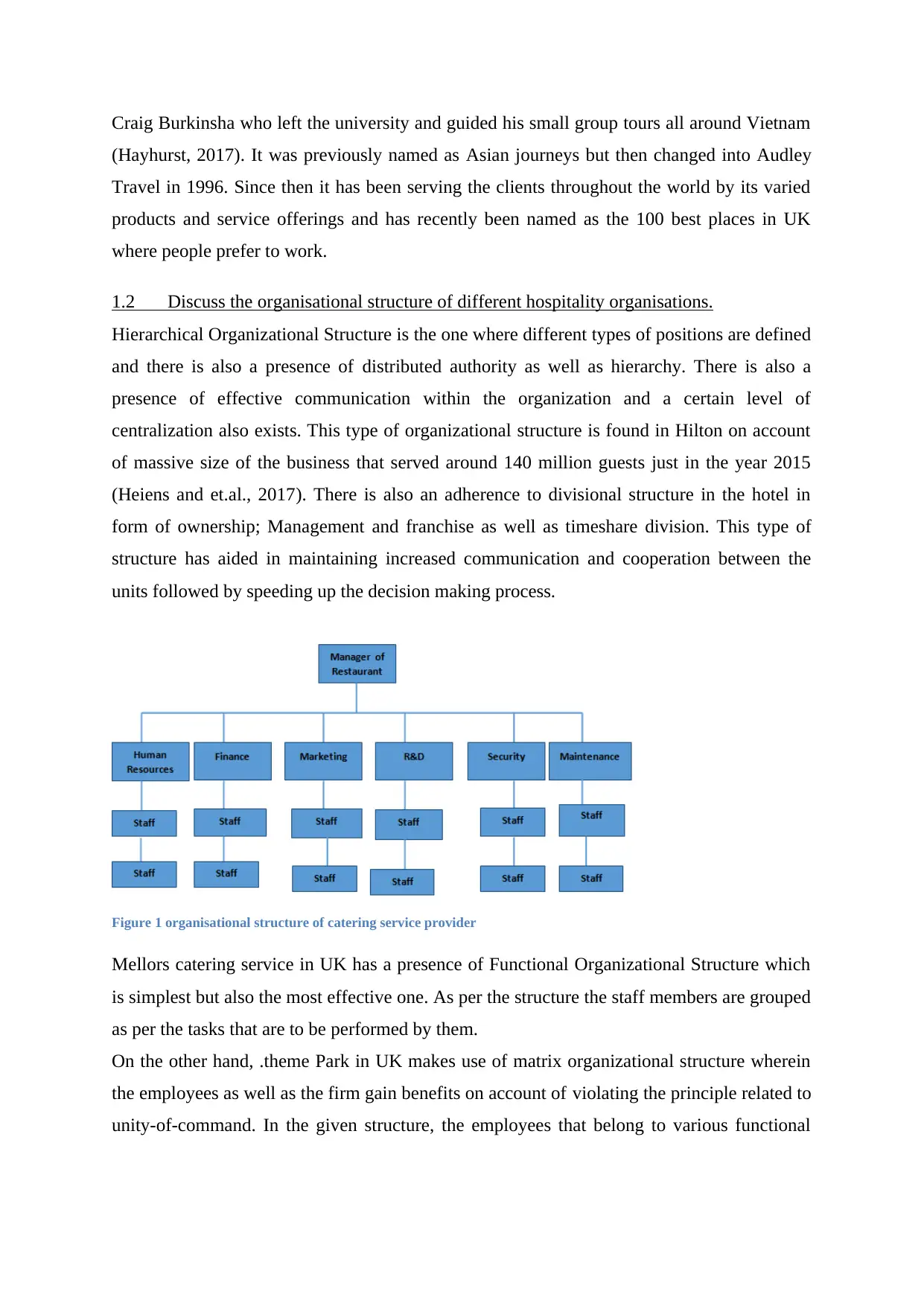
Craig Burkinsha who left the university and guided his small group tours all around Vietnam
(Hayhurst, 2017). It was previously named as Asian journeys but then changed into Audley
Travel in 1996. Since then it has been serving the clients throughout the world by its varied
products and service offerings and has recently been named as the 100 best places in UK
where people prefer to work.
1.2 Discuss the organisational structure of different hospitality organisations.
Hierarchical Organizational Structure is the one where different types of positions are defined
and there is also a presence of distributed authority as well as hierarchy. There is also a
presence of effective communication within the organization and a certain level of
centralization also exists. This type of organizational structure is found in Hilton on account
of massive size of the business that served around 140 million guests just in the year 2015
(Heiens and et.al., 2017). There is also an adherence to divisional structure in the hotel in
form of ownership; Management and franchise as well as timeshare division. This type of
structure has aided in maintaining increased communication and cooperation between the
units followed by speeding up the decision making process.
Figure 1 organisational structure of catering service provider
Mellors catering service in UK has a presence of Functional Organizational Structure which
is simplest but also the most effective one. As per the structure the staff members are grouped
as per the tasks that are to be performed by them.
On the other hand, .theme Park in UK makes use of matrix organizational structure wherein
the employees as well as the firm gain benefits on account of violating the principle related to
unity-of-command. In the given structure, the employees that belong to various functional
(Hayhurst, 2017). It was previously named as Asian journeys but then changed into Audley
Travel in 1996. Since then it has been serving the clients throughout the world by its varied
products and service offerings and has recently been named as the 100 best places in UK
where people prefer to work.
1.2 Discuss the organisational structure of different hospitality organisations.
Hierarchical Organizational Structure is the one where different types of positions are defined
and there is also a presence of distributed authority as well as hierarchy. There is also a
presence of effective communication within the organization and a certain level of
centralization also exists. This type of organizational structure is found in Hilton on account
of massive size of the business that served around 140 million guests just in the year 2015
(Heiens and et.al., 2017). There is also an adherence to divisional structure in the hotel in
form of ownership; Management and franchise as well as timeshare division. This type of
structure has aided in maintaining increased communication and cooperation between the
units followed by speeding up the decision making process.
Figure 1 organisational structure of catering service provider
Mellors catering service in UK has a presence of Functional Organizational Structure which
is simplest but also the most effective one. As per the structure the staff members are grouped
as per the tasks that are to be performed by them.
On the other hand, .theme Park in UK makes use of matrix organizational structure wherein
the employees as well as the firm gain benefits on account of violating the principle related to
unity-of-command. In the given structure, the employees that belong to various functional
Secure Best Marks with AI Grader
Need help grading? Try our AI Grader for instant feedback on your assignments.
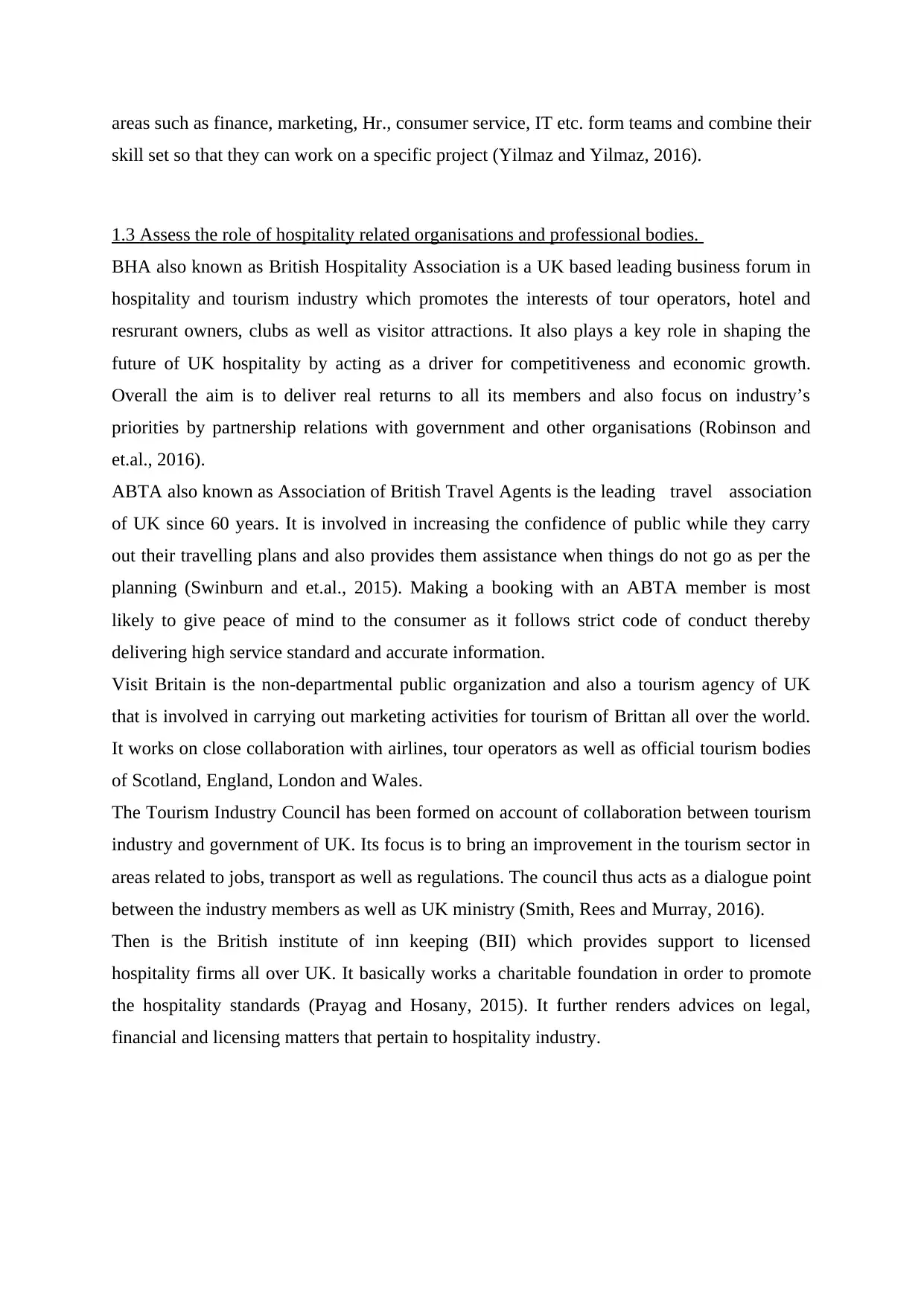
areas such as finance, marketing, Hr., consumer service, IT etc. form teams and combine their
skill set so that they can work on a specific project (Yilmaz and Yilmaz, 2016).
1.3 Assess the role of hospitality related organisations and professional bodies.
BHA also known as British Hospitality Association is a UK based leading business forum in
hospitality and tourism industry which promotes the interests of tour operators, hotel and
resrurant owners, clubs as well as visitor attractions. It also plays a key role in shaping the
future of UK hospitality by acting as a driver for competitiveness and economic growth.
Overall the aim is to deliver real returns to all its members and also focus on industry’s
priorities by partnership relations with government and other organisations (Robinson and
et.al., 2016).
ABTA also known as Association of British Travel Agents is the leading travel association
of UK since 60 years. It is involved in increasing the confidence of public while they carry
out their travelling plans and also provides them assistance when things do not go as per the
planning (Swinburn and et.al., 2015). Making a booking with an ABTA member is most
likely to give peace of mind to the consumer as it follows strict code of conduct thereby
delivering high service standard and accurate information.
Visit Britain is the non-departmental public organization and also a tourism agency of UK
that is involved in carrying out marketing activities for tourism of Brittan all over the world.
It works on close collaboration with airlines, tour operators as well as official tourism bodies
of Scotland, England, London and Wales.
The Tourism Industry Council has been formed on account of collaboration between tourism
industry and government of UK. Its focus is to bring an improvement in the tourism sector in
areas related to jobs, transport as well as regulations. The council thus acts as a dialogue point
between the industry members as well as UK ministry (Smith, Rees and Murray, 2016).
Then is the British institute of inn keeping (BII) which provides support to licensed
hospitality firms all over UK. It basically works a charitable foundation in order to promote
the hospitality standards (Prayag and Hosany, 2015). It further renders advices on legal,
financial and licensing matters that pertain to hospitality industry.
skill set so that they can work on a specific project (Yilmaz and Yilmaz, 2016).
1.3 Assess the role of hospitality related organisations and professional bodies.
BHA also known as British Hospitality Association is a UK based leading business forum in
hospitality and tourism industry which promotes the interests of tour operators, hotel and
resrurant owners, clubs as well as visitor attractions. It also plays a key role in shaping the
future of UK hospitality by acting as a driver for competitiveness and economic growth.
Overall the aim is to deliver real returns to all its members and also focus on industry’s
priorities by partnership relations with government and other organisations (Robinson and
et.al., 2016).
ABTA also known as Association of British Travel Agents is the leading travel association
of UK since 60 years. It is involved in increasing the confidence of public while they carry
out their travelling plans and also provides them assistance when things do not go as per the
planning (Swinburn and et.al., 2015). Making a booking with an ABTA member is most
likely to give peace of mind to the consumer as it follows strict code of conduct thereby
delivering high service standard and accurate information.
Visit Britain is the non-departmental public organization and also a tourism agency of UK
that is involved in carrying out marketing activities for tourism of Brittan all over the world.
It works on close collaboration with airlines, tour operators as well as official tourism bodies
of Scotland, England, London and Wales.
The Tourism Industry Council has been formed on account of collaboration between tourism
industry and government of UK. Its focus is to bring an improvement in the tourism sector in
areas related to jobs, transport as well as regulations. The council thus acts as a dialogue point
between the industry members as well as UK ministry (Smith, Rees and Murray, 2016).
Then is the British institute of inn keeping (BII) which provides support to licensed
hospitality firms all over UK. It basically works a charitable foundation in order to promote
the hospitality standards (Prayag and Hosany, 2015). It further renders advices on legal,
financial and licensing matters that pertain to hospitality industry.
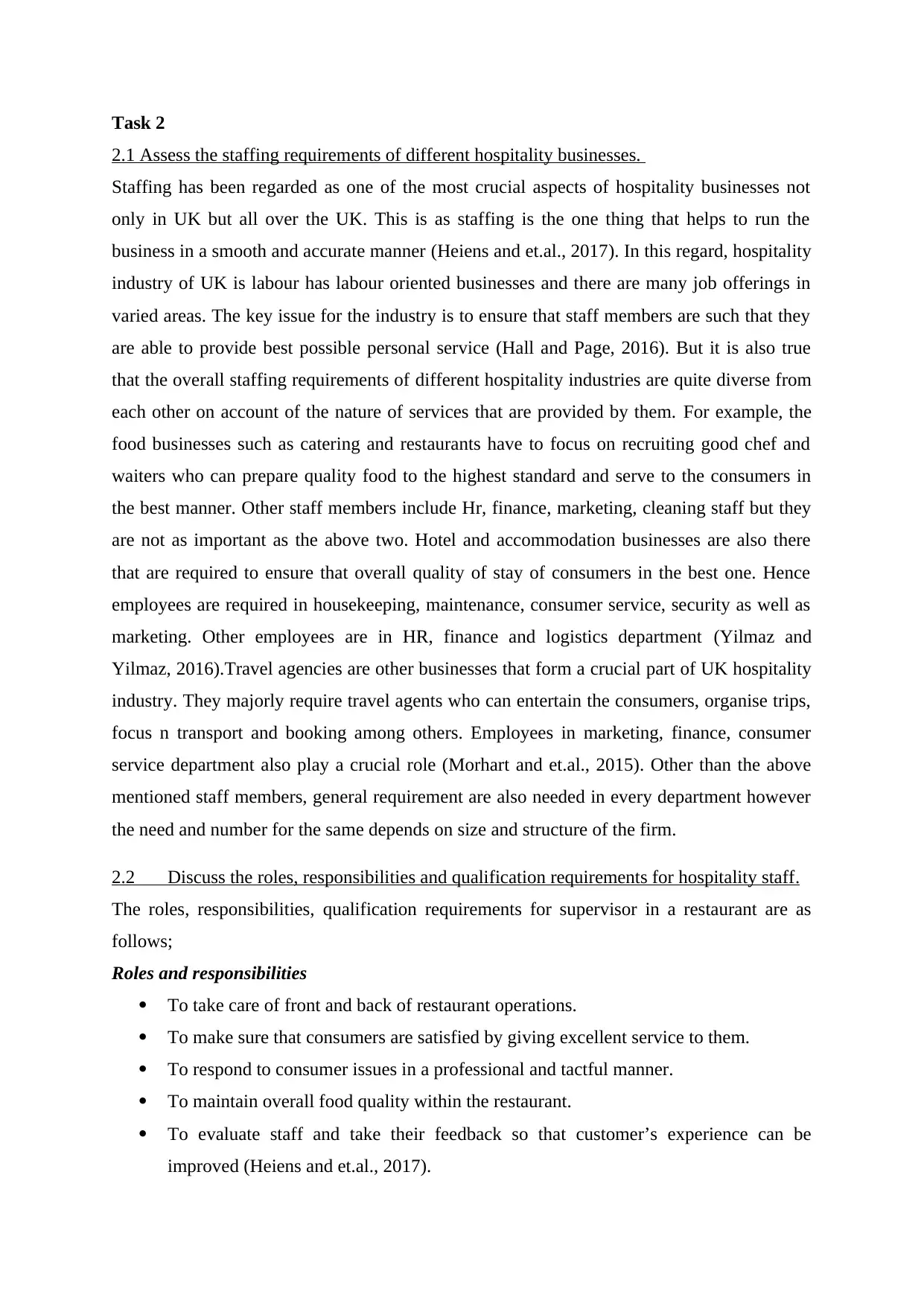
Task 2
2.1 Assess the staffing requirements of different hospitality businesses.
Staffing has been regarded as one of the most crucial aspects of hospitality businesses not
only in UK but all over the UK. This is as staffing is the one thing that helps to run the
business in a smooth and accurate manner (Heiens and et.al., 2017). In this regard, hospitality
industry of UK is labour has labour oriented businesses and there are many job offerings in
varied areas. The key issue for the industry is to ensure that staff members are such that they
are able to provide best possible personal service (Hall and Page, 2016). But it is also true
that the overall staffing requirements of different hospitality industries are quite diverse from
each other on account of the nature of services that are provided by them. For example, the
food businesses such as catering and restaurants have to focus on recruiting good chef and
waiters who can prepare quality food to the highest standard and serve to the consumers in
the best manner. Other staff members include Hr, finance, marketing, cleaning staff but they
are not as important as the above two. Hotel and accommodation businesses are also there
that are required to ensure that overall quality of stay of consumers in the best one. Hence
employees are required in housekeeping, maintenance, consumer service, security as well as
marketing. Other employees are in HR, finance and logistics department (Yilmaz and
Yilmaz, 2016).Travel agencies are other businesses that form a crucial part of UK hospitality
industry. They majorly require travel agents who can entertain the consumers, organise trips,
focus n transport and booking among others. Employees in marketing, finance, consumer
service department also play a crucial role (Morhart and et.al., 2015). Other than the above
mentioned staff members, general requirement are also needed in every department however
the need and number for the same depends on size and structure of the firm.
2.2 Discuss the roles, responsibilities and qualification requirements for hospitality staff.
The roles, responsibilities, qualification requirements for supervisor in a restaurant are as
follows;
Roles and responsibilities
To take care of front and back of restaurant operations.
To make sure that consumers are satisfied by giving excellent service to them.
To respond to consumer issues in a professional and tactful manner.
To maintain overall food quality within the restaurant.
To evaluate staff and take their feedback so that customer’s experience can be
improved (Heiens and et.al., 2017).
2.1 Assess the staffing requirements of different hospitality businesses.
Staffing has been regarded as one of the most crucial aspects of hospitality businesses not
only in UK but all over the UK. This is as staffing is the one thing that helps to run the
business in a smooth and accurate manner (Heiens and et.al., 2017). In this regard, hospitality
industry of UK is labour has labour oriented businesses and there are many job offerings in
varied areas. The key issue for the industry is to ensure that staff members are such that they
are able to provide best possible personal service (Hall and Page, 2016). But it is also true
that the overall staffing requirements of different hospitality industries are quite diverse from
each other on account of the nature of services that are provided by them. For example, the
food businesses such as catering and restaurants have to focus on recruiting good chef and
waiters who can prepare quality food to the highest standard and serve to the consumers in
the best manner. Other staff members include Hr, finance, marketing, cleaning staff but they
are not as important as the above two. Hotel and accommodation businesses are also there
that are required to ensure that overall quality of stay of consumers in the best one. Hence
employees are required in housekeeping, maintenance, consumer service, security as well as
marketing. Other employees are in HR, finance and logistics department (Yilmaz and
Yilmaz, 2016).Travel agencies are other businesses that form a crucial part of UK hospitality
industry. They majorly require travel agents who can entertain the consumers, organise trips,
focus n transport and booking among others. Employees in marketing, finance, consumer
service department also play a crucial role (Morhart and et.al., 2015). Other than the above
mentioned staff members, general requirement are also needed in every department however
the need and number for the same depends on size and structure of the firm.
2.2 Discuss the roles, responsibilities and qualification requirements for hospitality staff.
The roles, responsibilities, qualification requirements for supervisor in a restaurant are as
follows;
Roles and responsibilities
To take care of front and back of restaurant operations.
To make sure that consumers are satisfied by giving excellent service to them.
To respond to consumer issues in a professional and tactful manner.
To maintain overall food quality within the restaurant.
To evaluate staff and take their feedback so that customer’s experience can be
improved (Heiens and et.al., 2017).
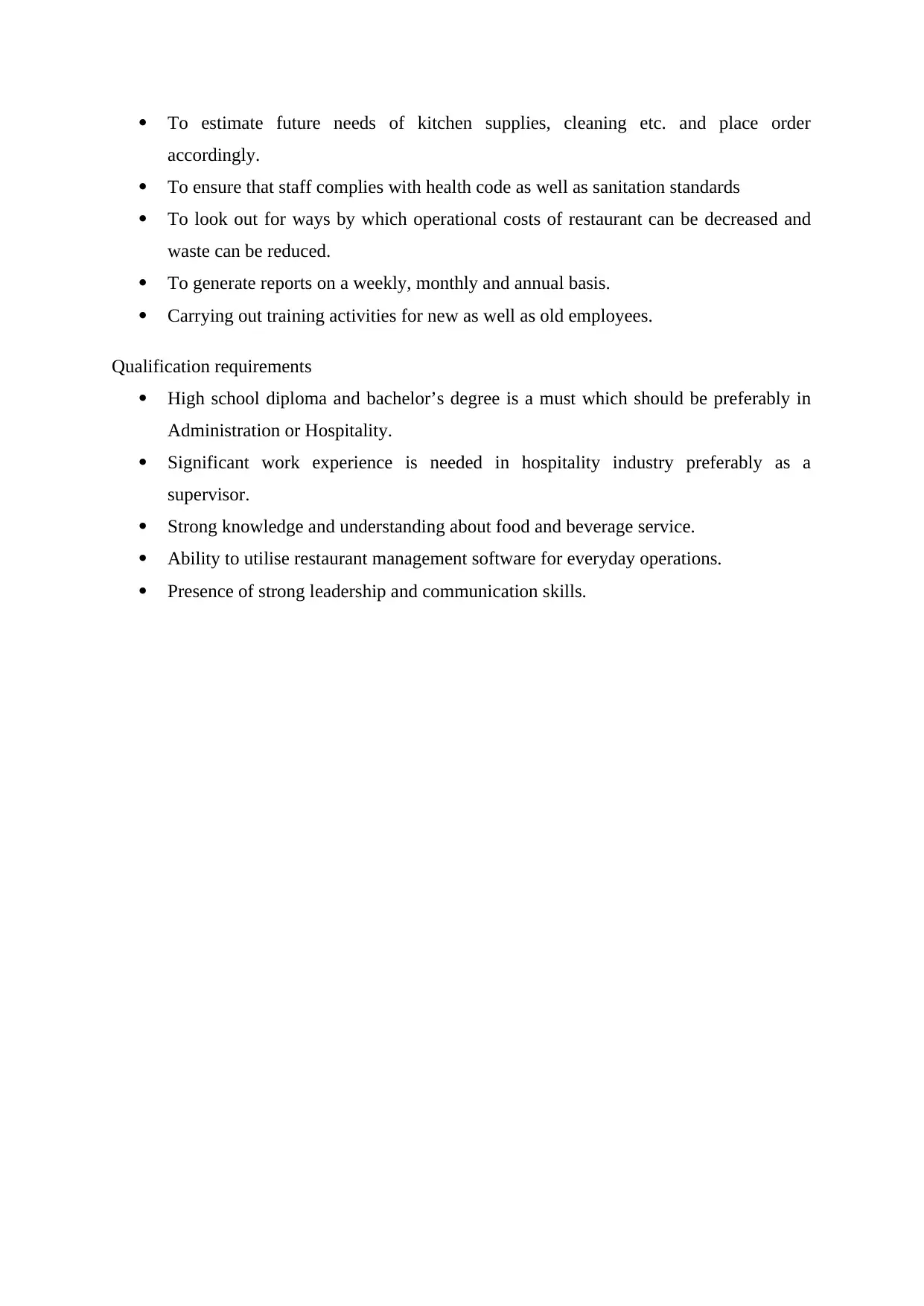
To estimate future needs of kitchen supplies, cleaning etc. and place order
accordingly.
To ensure that staff complies with health code as well as sanitation standards
To look out for ways by which operational costs of restaurant can be decreased and
waste can be reduced.
To generate reports on a weekly, monthly and annual basis.
Carrying out training activities for new as well as old employees.
Qualification requirements
High school diploma and bachelor’s degree is a must which should be preferably in
Administration or Hospitality.
Significant work experience is needed in hospitality industry preferably as a
supervisor.
Strong knowledge and understanding about food and beverage service.
Ability to utilise restaurant management software for everyday operations.
Presence of strong leadership and communication skills.
accordingly.
To ensure that staff complies with health code as well as sanitation standards
To look out for ways by which operational costs of restaurant can be decreased and
waste can be reduced.
To generate reports on a weekly, monthly and annual basis.
Carrying out training activities for new as well as old employees.
Qualification requirements
High school diploma and bachelor’s degree is a must which should be preferably in
Administration or Hospitality.
Significant work experience is needed in hospitality industry preferably as a
supervisor.
Strong knowledge and understanding about food and beverage service.
Ability to utilise restaurant management software for everyday operations.
Presence of strong leadership and communication skills.
Paraphrase This Document
Need a fresh take? Get an instant paraphrase of this document with our AI Paraphraser
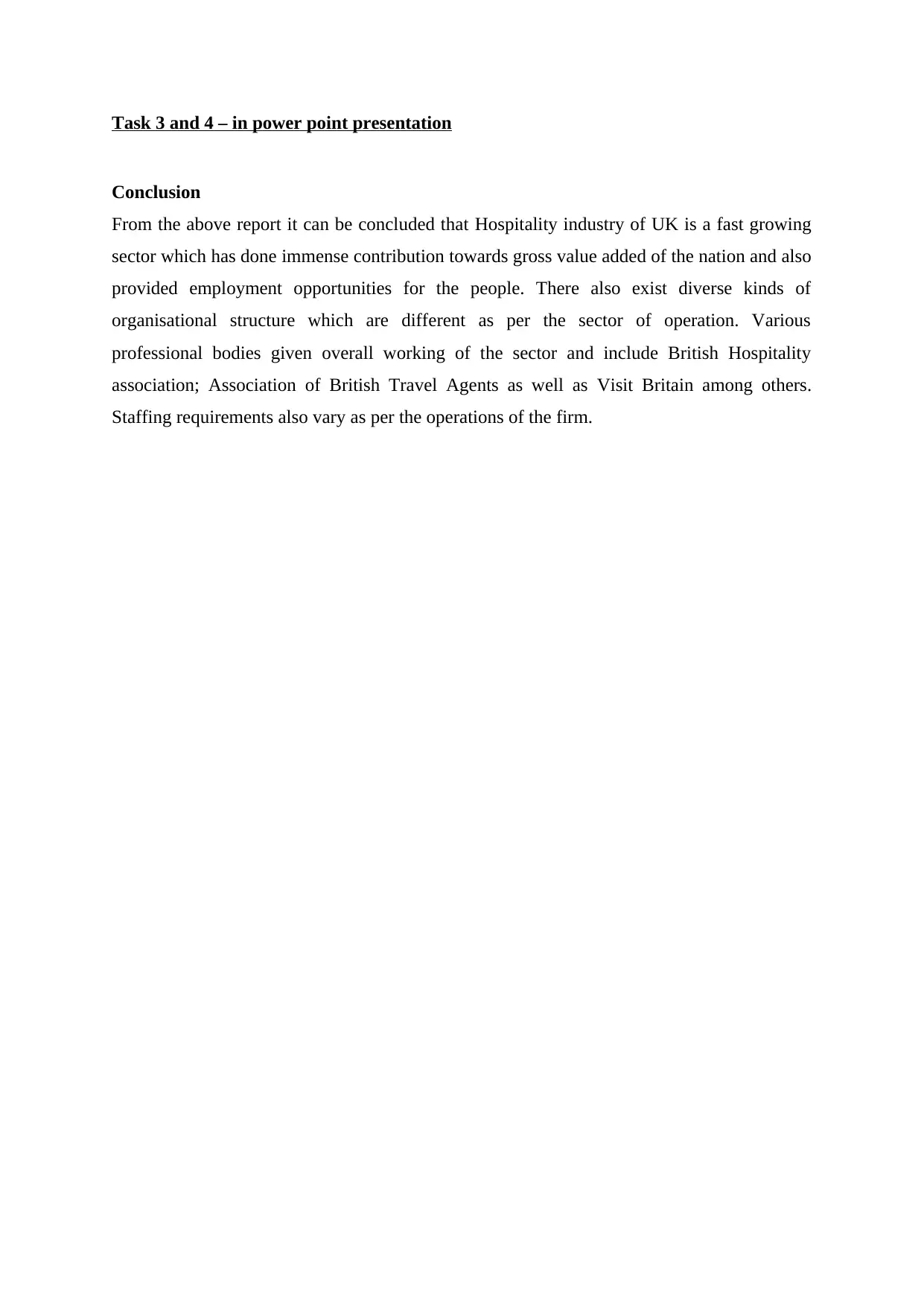
Task 3 and 4 – in power point presentation
Conclusion
From the above report it can be concluded that Hospitality industry of UK is a fast growing
sector which has done immense contribution towards gross value added of the nation and also
provided employment opportunities for the people. There also exist diverse kinds of
organisational structure which are different as per the sector of operation. Various
professional bodies given overall working of the sector and include British Hospitality
association; Association of British Travel Agents as well as Visit Britain among others.
Staffing requirements also vary as per the operations of the firm.
Conclusion
From the above report it can be concluded that Hospitality industry of UK is a fast growing
sector which has done immense contribution towards gross value added of the nation and also
provided employment opportunities for the people. There also exist diverse kinds of
organisational structure which are different as per the sector of operation. Various
professional bodies given overall working of the sector and include British Hospitality
association; Association of British Travel Agents as well as Visit Britain among others.
Staffing requirements also vary as per the operations of the firm.
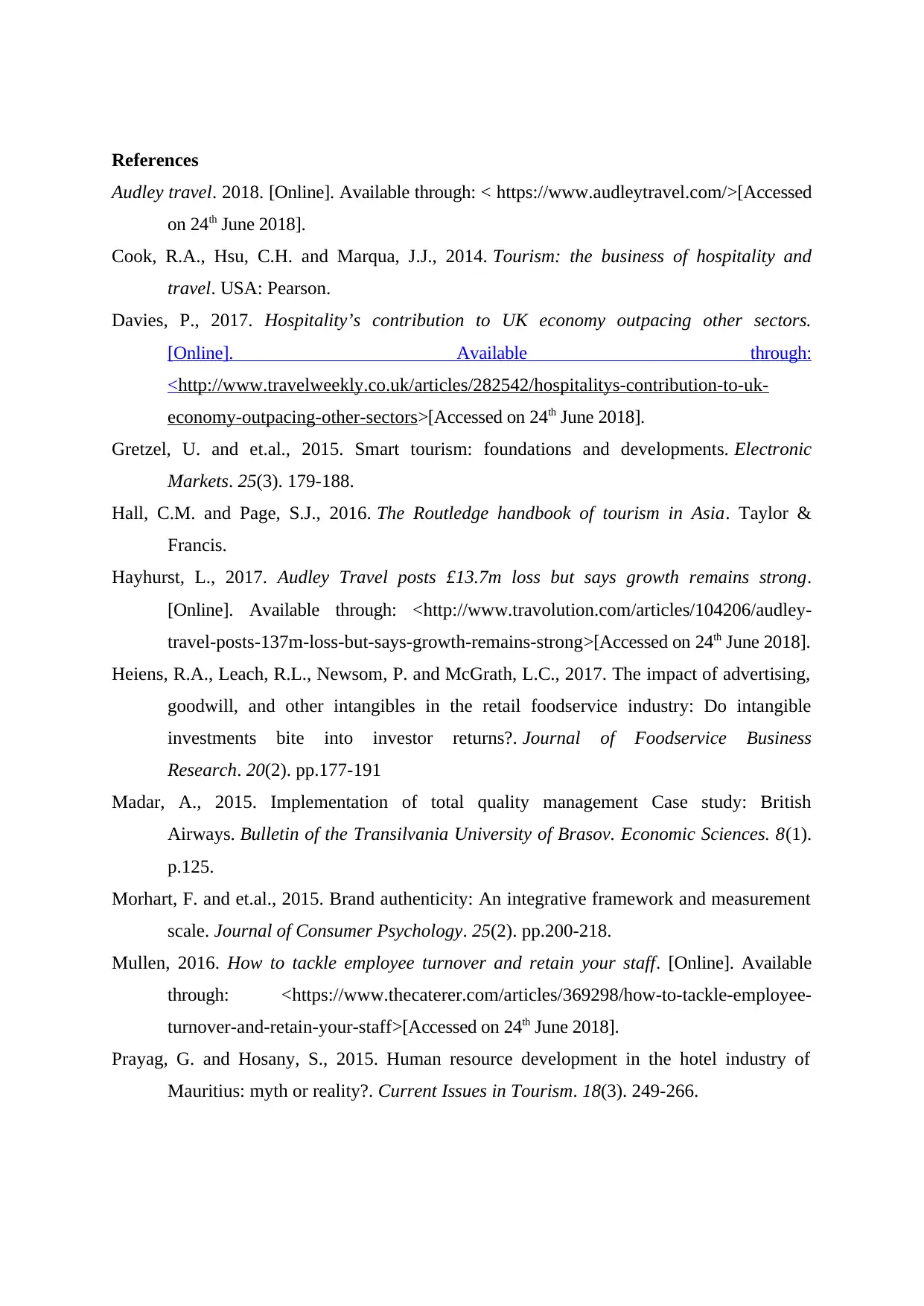
References
Audley travel. 2018. [Online]. Available through: < https://www.audleytravel.com/>[Accessed
on 24th June 2018].
Cook, R.A., Hsu, C.H. and Marqua, J.J., 2014. Tourism: the business of hospitality and
travel. USA: Pearson.
Davies, P., 2017. Hospitality’s contribution to UK economy outpacing other sectors.
[Online]. Available through:
<http://www.travelweekly.co.uk/articles/282542/hospitalitys-contribution-to-uk-
economy-outpacing-other-sectors>[Accessed on 24th June 2018].
Gretzel, U. and et.al., 2015. Smart tourism: foundations and developments. Electronic
Markets. 25(3). 179-188.
Hall, C.M. and Page, S.J., 2016. The Routledge handbook of tourism in Asia. Taylor &
Francis.
Hayhurst, L., 2017. Audley Travel posts £13.7m loss but says growth remains strong.
[Online]. Available through: <http://www.travolution.com/articles/104206/audley-
travel-posts-137m-loss-but-says-growth-remains-strong>[Accessed on 24th June 2018].
Heiens, R.A., Leach, R.L., Newsom, P. and McGrath, L.C., 2017. The impact of advertising,
goodwill, and other intangibles in the retail foodservice industry: Do intangible
investments bite into investor returns?. Journal of Foodservice Business
Research. 20(2). pp.177-191
Madar, A., 2015. Implementation of total quality management Case study: British
Airways. Bulletin of the Transilvania University of Brasov. Economic Sciences. 8(1).
p.125.
Morhart, F. and et.al., 2015. Brand authenticity: An integrative framework and measurement
scale. Journal of Consumer Psychology. 25(2). pp.200-218.
Mullen, 2016. How to tackle employee turnover and retain your staff. [Online]. Available
through: <https://www.thecaterer.com/articles/369298/how-to-tackle-employee-
turnover-and-retain-your-staff>[Accessed on 24th June 2018].
Prayag, G. and Hosany, S., 2015. Human resource development in the hotel industry of
Mauritius: myth or reality?. Current Issues in Tourism. 18(3). 249-266.
Audley travel. 2018. [Online]. Available through: < https://www.audleytravel.com/>[Accessed
on 24th June 2018].
Cook, R.A., Hsu, C.H. and Marqua, J.J., 2014. Tourism: the business of hospitality and
travel. USA: Pearson.
Davies, P., 2017. Hospitality’s contribution to UK economy outpacing other sectors.
[Online]. Available through:
<http://www.travelweekly.co.uk/articles/282542/hospitalitys-contribution-to-uk-
economy-outpacing-other-sectors>[Accessed on 24th June 2018].
Gretzel, U. and et.al., 2015. Smart tourism: foundations and developments. Electronic
Markets. 25(3). 179-188.
Hall, C.M. and Page, S.J., 2016. The Routledge handbook of tourism in Asia. Taylor &
Francis.
Hayhurst, L., 2017. Audley Travel posts £13.7m loss but says growth remains strong.
[Online]. Available through: <http://www.travolution.com/articles/104206/audley-
travel-posts-137m-loss-but-says-growth-remains-strong>[Accessed on 24th June 2018].
Heiens, R.A., Leach, R.L., Newsom, P. and McGrath, L.C., 2017. The impact of advertising,
goodwill, and other intangibles in the retail foodservice industry: Do intangible
investments bite into investor returns?. Journal of Foodservice Business
Research. 20(2). pp.177-191
Madar, A., 2015. Implementation of total quality management Case study: British
Airways. Bulletin of the Transilvania University of Brasov. Economic Sciences. 8(1).
p.125.
Morhart, F. and et.al., 2015. Brand authenticity: An integrative framework and measurement
scale. Journal of Consumer Psychology. 25(2). pp.200-218.
Mullen, 2016. How to tackle employee turnover and retain your staff. [Online]. Available
through: <https://www.thecaterer.com/articles/369298/how-to-tackle-employee-
turnover-and-retain-your-staff>[Accessed on 24th June 2018].
Prayag, G. and Hosany, S., 2015. Human resource development in the hotel industry of
Mauritius: myth or reality?. Current Issues in Tourism. 18(3). 249-266.
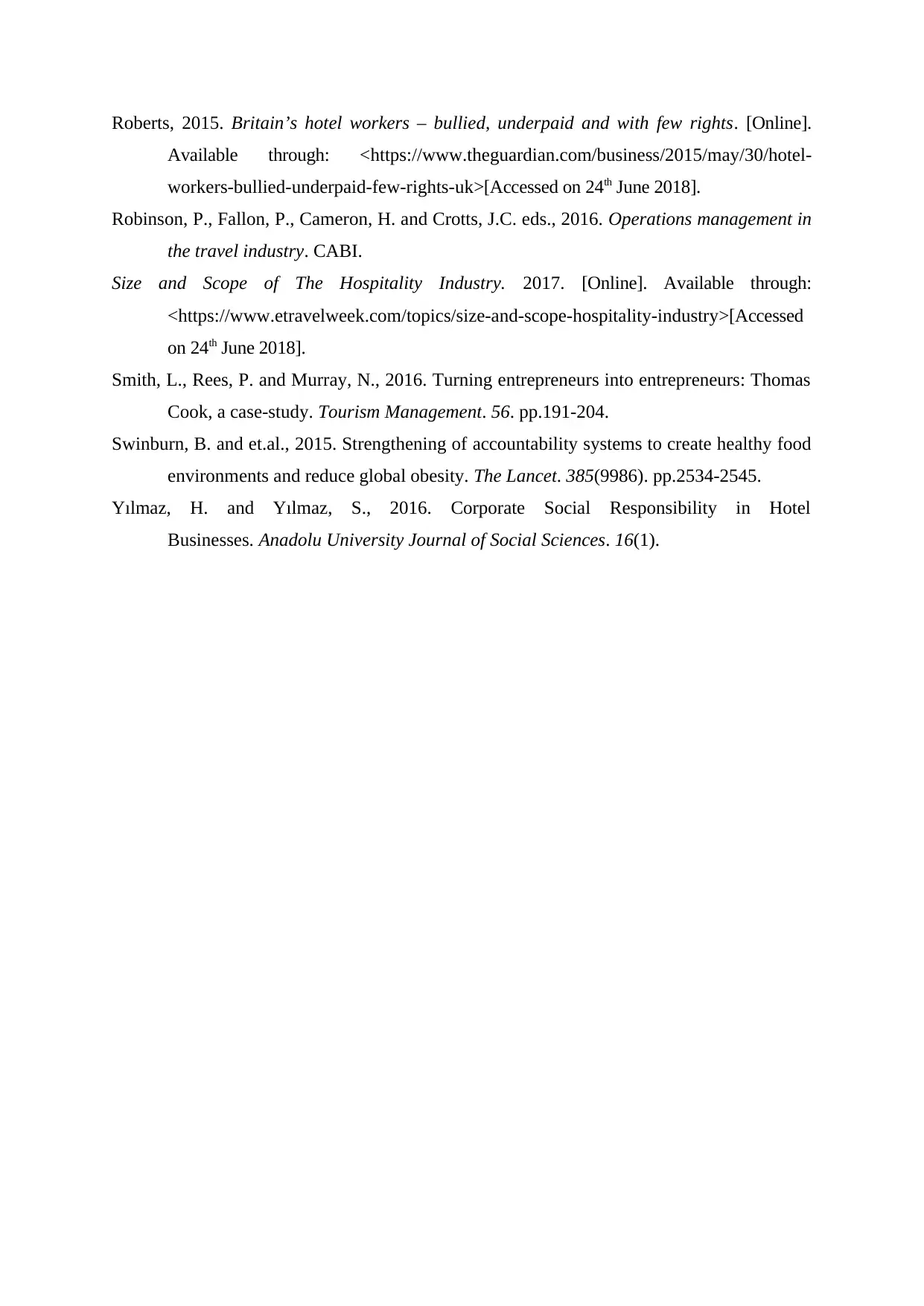
Roberts, 2015. Britain’s hotel workers – bullied, underpaid and with few rights. [Online].
Available through: <https://www.theguardian.com/business/2015/may/30/hotel-
workers-bullied-underpaid-few-rights-uk>[Accessed on 24th June 2018].
Robinson, P., Fallon, P., Cameron, H. and Crotts, J.C. eds., 2016. Operations management in
the travel industry. CABI.
Size and Scope of The Hospitality Industry. 2017. [Online]. Available through:
<https://www.etravelweek.com/topics/size-and-scope-hospitality-industry>[Accessed
on 24th June 2018].
Smith, L., Rees, P. and Murray, N., 2016. Turning entrepreneurs into entrepreneurs: Thomas
Cook, a case-study. Tourism Management. 56. pp.191-204.
Swinburn, B. and et.al., 2015. Strengthening of accountability systems to create healthy food
environments and reduce global obesity. The Lancet. 385(9986). pp.2534-2545.
Yılmaz, H. and Yılmaz, S., 2016. Corporate Social Responsibility in Hotel
Businesses. Anadolu University Journal of Social Sciences. 16(1).
Available through: <https://www.theguardian.com/business/2015/may/30/hotel-
workers-bullied-underpaid-few-rights-uk>[Accessed on 24th June 2018].
Robinson, P., Fallon, P., Cameron, H. and Crotts, J.C. eds., 2016. Operations management in
the travel industry. CABI.
Size and Scope of The Hospitality Industry. 2017. [Online]. Available through:
<https://www.etravelweek.com/topics/size-and-scope-hospitality-industry>[Accessed
on 24th June 2018].
Smith, L., Rees, P. and Murray, N., 2016. Turning entrepreneurs into entrepreneurs: Thomas
Cook, a case-study. Tourism Management. 56. pp.191-204.
Swinburn, B. and et.al., 2015. Strengthening of accountability systems to create healthy food
environments and reduce global obesity. The Lancet. 385(9986). pp.2534-2545.
Yılmaz, H. and Yılmaz, S., 2016. Corporate Social Responsibility in Hotel
Businesses. Anadolu University Journal of Social Sciences. 16(1).
1 out of 10
Related Documents
Your All-in-One AI-Powered Toolkit for Academic Success.
+13062052269
info@desklib.com
Available 24*7 on WhatsApp / Email
![[object Object]](/_next/static/media/star-bottom.7253800d.svg)
Unlock your academic potential
© 2024 | Zucol Services PVT LTD | All rights reserved.





